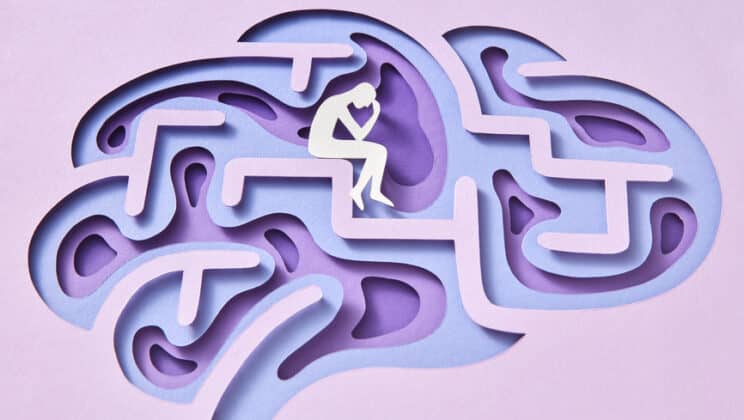Eating Disorder Symptoms: Do I Need Treatment?
February 26, 2024
Trigger warning: Contains references to binge eating, purging, restricting, over-exercising, and other eating disorder symptoms.
Eating disorder symptoms can feel like they’ve taken you hostage, but you can recover and reclaim your life. We sat down with leading eating disorder experts from Lyra Health and our partner organizations to share valuable insights on eating disorder signs, support, and treatment.
What is an eating disorder?
An eating disorder is a mental health condition and brain disorder involving unhealthy and potentially damaging eating habits, a distorted body image, and a preoccupation with food and weight. If you’re struggling, you’re not alone. “Eating disorders are more common than you think, affecting about 8-10% of the population, and they can be treated,” said Tom Hildebrandt, PsyD, FAED, chief of the Mount Sinai Center of Excellence in Eating and Weight Disorder, a leader in developing novel interventions for eating disorder treatment and a trusted Lyra partner. It’s important to get help because eating disorders can put you at risk for malnutrition, electrolyte and hormone imbalances, bone density loss, and heart issues, and can be fatal if left untreated.
Do I have an eating disorder?
It can be hard to know if you have an eating disorder. Eating disorders come in many forms, myths about eating disorders abound, and some people will have more than one type of eating disorder in their lifetime.
“If you're worried that you may have an eating disorder, it's likely time to talk to a professional,” said Jillian Lampert, PhD, chief strategy officer at Accanto Health, with esteemed treatment programs The Emily Program and Veritas Collaborative and a trusted Lyra partner. “You may need a listening ear, or you may need some form of treatment. Either way, reaching out to someone who’s trained in eating disorder symptoms and treatment is the first step toward recovery. Many people say they want to try to ‘do it themselves,’ but eating disorder recovery requires support and encouragement as well as a lot of hard work. Please ask for help.”
Understanding the different eating disorder symptoms can be an important first step toward healing.
Anorexia nervosa symptoms
Signs of anorexia can include significant weight loss, excessive exercise, restricting food, or avoiding certain foods for fear of gaining weight. Studies show that people with anorexia have high expectations of themselves and may struggle with perfectionism.
Bulimia nervosa symptoms
People with bulimia may eat large amounts of food quickly, feel out of control when eating, and then vomit, skip meals, or use laxatives to compensate for the calories. Bulimia symptoms may also include frequent fluctuations in weight, tooth erosion, or swollen salivary glands.
Binge eating disorder symptoms
Binge eating disorder involves eating large amounts of food quickly and to the point that you’re uncomfortable. You may feel you can't control your eating during a binge, and struggle to lose weight despite dieting.
Avoidant/restrictive food intake disorder (ARFID) symptoms
People with ARFID may fear that something bad will happen when they eat, like choking. You may eat very little food—resulting in too few calories—and stick to a narrow range of foods because of the way certain textures or smells affect you.
Other specified feeding or eating disorders (OSFED) symptoms
OSFED includes eating disorder symptoms that don’t fit within the previous four eating disorder types. One example is atypical anorexia nervosa, which is when you restrict food intake and fear gaining weight, despite maintaining an average or higher weight.
“While symptoms vary, what most eating disorders have in common is a preoccupation with food, weight, or body image that’s interfering with your life and well-being,” said Angela Celio Doyle, PhD, vice president of behavioral health at Equip, a renowned virtual eating disorder treatment program and trusted Lyra partner. “If you or a loved one shows any eating disorder symptoms, it’s important to get support from a health care professional who specializes in eating disorders.”
What type of eating disorder treatment do I need?
If you notice any of these eating disorder signs in yourself or a loved one, the next step is learning about treatment options. There are different levels of care, depending on the intensity and severity of your eating disorder symptoms.
“We look at several factors to determine the appropriate level of care,” said Jenni Thome, PhD, a clinical quality supervisor at Lyra. “For instance, are you medically stable and able to make changes with outpatient therapy and medical care, or do you need a more structured environment to support those changes and for your safety?”
Here’s a brief overview of the different types of eating disorder treatment. Working together, medical and mental health professionals can assess your physical and mental health and point you to the right level of care for your needs.
Initial assessment
An assessment with a mental health provider is often a good first step in helping you determine an appropriate level of care and address any physiological concerns. Many clients address the root causes of eating disorder symptoms in individual therapy. This is often combined with other supports like group therapy, medical monitoring, medication management, and nutrition counseling. A therapist can help connect you with other specialists and levels of care if needed. For example, Lyra offers in-person and online therapy and provides referrals to vetted, evidence-based partners when needed. This includes higher levels of care like inpatient, residential, and intensive outpatient programs.
Outpatient eating disorder treatment
During outpatient care, you live at home and work with multidisciplinary providers for around three hours a week. Outpatient treatment may include individual and group counseling as well as appointments with dietitians, physicians, and other specialists as needed. Outpatient eating disorder treatment is ideal if you don’t require intensive medical monitoring or ongoing supervision, are motivated in recovery, and can manage daily stressors safely.
Some therapy and outpatient programs are available virtually. “Research shows us that virtual eating disorder treatment works as well as face-to-face care for most people,” said Dr. Doyle. “Breaking down geographical barriers to specialists and allowing clients to experience and work through real-life triggers during treatment are just a couple of the benefits we’ve seen in our virtual eating disorder programs.”
Intensive outpatient programs (IOP)
IOP is more structured than outpatient care. It involves several hours of treatment multiple times per week. IOP provides a higher level of support for moderate to severe eating disorder symptoms. It could be a good fit if you need more care than regular outpatient treatment and have a supportive home environment.
Partial hospitalization program (PHP)
A step up in intensity from intensive outpatient, PHPs are highly structured day programs that meet most days a week. These programs can be a starting point for treatment or a bridge between inpatient and outpatient care. You’ll spend most of the day at an eating disorder treatment center and return home in the evenings. PHPs offer individual and group therapy, medical monitoring, and nutritional support. If you have several eating disorder symptoms, but don't require 24-hour supervision and medical monitoring, a PHP could be an option.
Residential eating disorder treatment
Residential eating disorder treatment includes 24-hour care and supervision while you live at the treatment center and attend programming during the day. It’s suited for people who need a highly structured environment with intensive therapy, medical monitoring, and nutritional rehabilitation.
Inpatient hospitalization
You may need inpatient hospitalization if you have eating disorder symptoms that require around-the-clock care. This level of support addresses immediate safety concerns and helps get you medically and mentally stabilized so you can participate in eating disorder treatment.
“Experience makes a big difference and knowing how to navigate all the medical and psychological issues that cause and maintain an eating disorder,” said Dr. Hildebrandt. “Eating disorders are chronic, lethal, and costly. Ignoring the early signs or failing to get the right care when you need it can lead to unnecessary consequences, including death.”
Common eating disorder treatments
It’s essential to choose a treatment provider that uses evidence-based therapies—approaches that have been scientifically validated and offer the best support for long-term recovery. Some examples include:
Behavioral therapy
Therapy provides practical tools to identify, challenge, and modify unhealthy thoughts and behaviors related to food, body image, and self-esteem. Behavioral therapy can also build positive changes in your relationship with food, nourishment, and yourself. Research has proven the effectiveness of cognitive behavioral therapy (CBT) for people with eating disorder symptoms. And dialectical behavior therapy (DBT) is particularly helpful for people with bulimia and binge eating disorder.
Medical monitoring & medication
Medications can be valuable complements to behavioral therapies. Research supports this combined approach for treating certain eating disorder symptoms as well as mental health conditions that often accompany eating disorders like depression and anxiety.
“Eating disorders often require a multifaceted approach to treatment, with therapy and nutritional counseling as mainstays,” said Dr. Lampert. “Medication can support recovery by helping manage mental health symptoms and potentially decreasing binge episodes and other disordered eating behaviors.”
Nutritional counseling
Nutritional counseling offers practical dietary guidance, helps you navigate a healthier relationship with food, and teaches sustainable eating habits.
Family therapy
Family therapy recognizes the role of family dynamics in eating disorders and teaches loved ones how to communicate with and support their loved one. A particular type of family therapy called family-based therapy (FBT) is particularly effective for children, adolescents, and young adults who can benefit from direct support from family members as they move toward recovery.
Helping a loved one with eating disorder symptoms
It’s normal to feel fearful and uncertain if a loved one is showing eating disorder signs. It can help to approach difficult conversations with empathy and share your observations and concerns without judgment, using “I” statements. For example, “I’ve noticed you’re losing a lot of weight, and I’m worried about you,” or “I’ve noticed you’re getting more preoccupied with your body, and I’m concerned about your health.”
“Sometimes loved ones worry the person will get mad, but the worst thing you can do is nothing,” said Laura Sabin Cabanillas, MA, LPCC, CEDS, clinical director at the Eating Recovery Center, an international center for eating disorders and mood, anxiety, and trauma-related disorders, and a trusted Lyra partner. “If they’re struggling with eating disorder symptoms and already in a bad spot, you can be the lifesaving voice they need to hear. Approach with compassion and curiosity, because when we ask questions and express genuine concern, it automatically feels non-judgmental.”
Getting help for eating disorder symptoms
Reaching out for support is a courageous step. Many people are navigating similar struggles, and effective treatment is available. At Lyra, we understand the complexities of eating disorders and partner with highly respected, evidence-based treatment providers like Accanto Health, Eating Recovery Center, Equip, and Mount Sinai to provide comprehensive support that meets the full spectrum of needs.
“It can be scary to ask for help, but the one thing that’s stronger than fear is hope, and we are hope holders,” said Cabanillas. “We will hold hope that things can change and get better for you until you can hold that hope for yourself.”
*This content should not take the place of professional medical advice.
Begin your recovery journey
You can get started today if your organization has Lyra.
Author
The Lyra Team
The Lyra Team is made up of clinicians, writers, and experts who are passionate about mental health and workplace well-being. With backgrounds in clinical psychology, journalism, content strategy, and product marketing, we create research-backed content to help individuals and organizations improve workforce mental health.
Reviewer
Jenni Thome, PhD, LCP
Jenni Gerlach-Thome, PhD, LCP has over 20 years of experience in mental health care, specializing in areas such as eating disorders, crisis intervention, counseling, consultation, assessment, training, DEI initiatives, and program development. Currently, Dr. Thome provides clinical oversight and administrative supervision to licensed providers at Lyra, while also providing individual therapy to clients.
Explore additional blogs

Mental health conditions
7 Myths About Eating Disorders

Mental health conditions
Recognizing the Signs of Suicide at Work

Mental health conditions